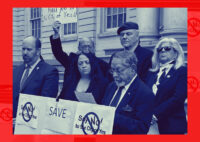
A legal case trying to nullify the City of Yes rezoning was dismissed in Staten Island state court Wednesday.
The petitioners, which included 100 groups, City Council members, community board members and state lawmakers, accused the Adams administration of violating city and state environmental laws in pushing through the plan’s zoning changes.
A judge, however, disagreed. The city’s land-use approval process “functioned as intended and created a voluminous and diverse record,” Judge Lizette Colon wrote in her decision.
The dismissal is a victory for developers and the Adams administration. The petitioners hoped a decision in their favor would not only overturn the City of Yes for Housing Opportunity legislation, including a rezoning to allow for 80,000 more units, but would also nullify the two other parts of the City of Yes project. The two other bills address climate change and economic opportunity.
Petitioners argued that the environmental impacts of the policy package were not appropriately studied. By segmenting the legislation in three sections, not providing alternatives and not proposing mitigation measures, the city failed to do a full environmental review as required by state law, they said.
The city responded by saying that since the goal was citywide housing production, it was impossible to provide mitigation measures or examine alternative ways to achieve the goal. Lawyers for the respondents also argued that the three City of Yes bills stand on their own, so they can be looked at in isolation.
Jack Lester, attorney for the petitioners, said he disagrees with the judge’s interpretation of environmental law. Dismissing the lack of mitigation measures because the project is citywide runs contrary to the “heart and soul” of New York environmental law, he said via email. The law “enshrines reducing negative impacts into the basic tenets of the statute and 5 decades of judicial interpretation,” he said.
In her conclusion, Judge Colon noted that many of the petitioners voiced their concerns about the zoning changes in the approval process.
“It is not the place of the court to second-guess policy decisions, nor interject policy opinions into this review of [state environmental law] compliance,” she wrote. “Rather, the court is merely here to confirm that respondents fulfilled their environmental review obligations under state and city law.”
Petitioners included conservative members of the city council, Robert Holden, Vickie Paladino, Joann Ariola and David Carr, as well as local civic groups and citywide advocates, such as the Met Council on Housing and the Black Institute.
“This decision upholding ‘City of Yes’ in the face of a bogus challenge clears the way for New Yorkers to benefit from these long-overdue changes in the years ahead. In total, the Adams administration has planned, preserved, or created over 433,250 homes, because making housing more affordable for working New Yorkers has been our top priority,” said a City Hall spokesperson in a statement. “Efforts by NIMBY opponents to stop City of Yes in the courts have died.”
Read more

Opponents sue to annul City of Yes

Council passes City of Yes to create 80K homes




